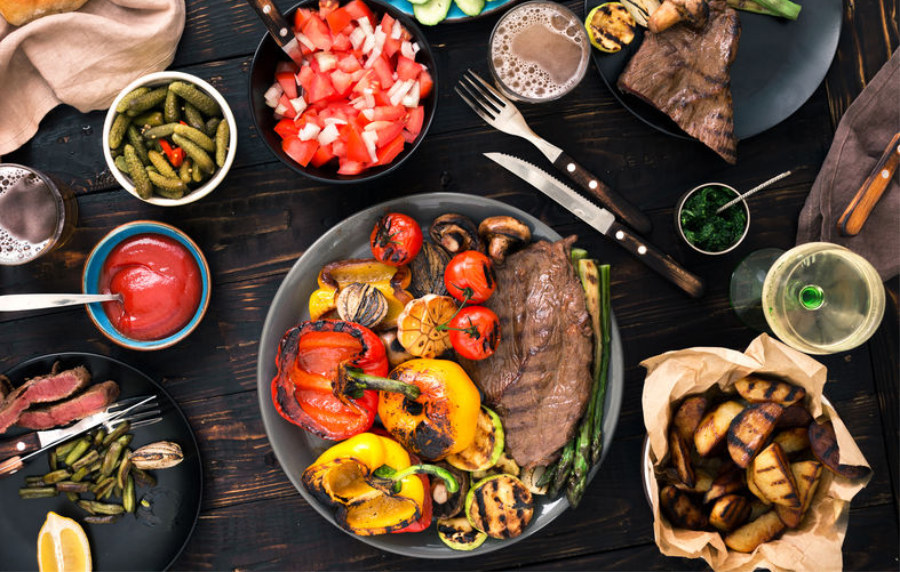In this article, I am going to highlight some of the challenges with grilling and barbequing food. How there may be some health implications with the foods you choose to cook and how you cook them. Equally I want to offer some solutions to help mitigate the potentially negative effects of this type of cooking.
If you are like me, you love to have a BBQ, some might even say amongst our close friends that our BBQs are somewhat famous. You haven’t had a barbeque till you’ve had one of our barbeques! Jokes obviously!
Outdoor dining, whilst an infrequent treat here in the UK is something that we really enjoy. For me it is the ultimate social meal experience. To be with friends, in the sun, cooking and sharing food and enjoying the odd drink, listening to some music would be one of my favourite types of days.
This article is not intended to be a killjoy or to be making you fearful of having a BBQ every so often, however, if like me you like to have BBQs frequently or you just want to cook and eat in the healthiest possible way when having a BBQ, then I have some tips for you.
Why is grilling and barbequing food potentially problematic?
High temperature cooking, such as that used when grilling or barbequing food, can lead to the production of so called “cooking toxicants”, heterocyclic amines (HAs) and polycyclic aromatic hydrocarbons (PAHs).
Both of these are known as mutagens, which have been shown to damage DNA and potentially contribute to a variety of cancers. These mutagens are formed when proteins and sugars within meat react under high temperatures. The smoke that is also created, in particular from charcoal-based grilling, contributes to the levels of PAHs, coating the meat.
Because of the above and the growing evidence linking cooking methods with particular types of cancer, such as prostate, breast and colorectal I feel it is worth looking for solutions to help reduce any potential harm.
What can I do to lower or protect myself from these Mutagens?
Cooking Methods
Of course, you can change the cooking method to avoid high temperature cooking. However, this is not a solution for me as I enjoy a good barbeque, so I want to have my cake and eat it!
You can certainly still barbeque and with a little more patience, you can cook at lower temperatures or ensure that you can easily control the height you are cooking at to help prevent the burning of the meat or fish you have on there.
Another alternative is to actually make your meat and fish smaller so that the contact time with the grill is shorter before it can be served. Perhaps using quicker cooking proteins like seafood and fish which required very little time at all.
Alternatively, you can create a parcel surrounding the food to avoid direct contact with the grill and the flames, avoiding the charring. Another solution is to focus on rotating your proteins as frequently as possible.
Interestingly the type of coal that you use is another consideration. One study demonstrated that using coconut shell charcoal recycled from waste coconut shells, resulted in less HAs and PAHs. For those non barbeque purists then a gas barbeque may be a healthier option as well.
Marinate
Marinating can help to protect against the production of more carcinogenic compounds. Adding meats/fish to marinades not only helps to increase flavour it can also help to reduce the formation of HAs.
Acid containing marinades are a good option, so marinades that contain lemon, lime or vinegars are a good idea.
Other ingredients to include in marinades are, mint, rosemary, thyme, garlic, onion, chilli, ginger, turmeric. These can be used as a marinade, mixed into ground meat or as a dry rub on to the meat or fish. These foods have also been shown to help reduce HAs.
Sub out the animal proteins for other choices
Another option is to look for alternatives to animal proteins, allowing you to limit the total animal protein in the meal. Courgettes, aubergine, peppers, sweetcorn are all great options to help fill your plate with more plant-based options. It is still important however that you try to minimise the level of charring even with plant-based foods.
Serve with colourful vegetables, fruits, herbs and spices
These plant-based foods are rich in antioxidants and can provide some protection and balance to the harmful substances created when we grill animal proteins.
Trying to eat a diet rich in phytonutrients is a cornerstone of any healthy diet. Learn more about phytonutrients.
We tend to add a large bowl of homemade coleslaw, pomegranate, a large salad, berries and more to help lift and balance the plate of food.
Try not to let the animal proteins dominate the plate, fill up first with the plant-based foods and then with the remaining ¼ of the plate this can be your space for grilled animal-based proteins if you so wish.
Contact Steve Grant Health
To learn more out how Steve Grant Health can assist you on your journey, please fill out the enquiry form below.
Please note that depending on your specific circumstances and goals, Steve may recommend that you work with one of the specialist practitioners within his network of trusted professionals.
If you have been referred by a clinician, please complete the form and ensure that you state who has referred you or have your practitioner email Steve direct to make a referral that way.
Click the button below to open the client enquiry form:
[widgetkit id=”643″]
References
- https://www.ncbi.nlm.nih.gov/pubmed/22459130
- https://www.ncbi.nlm.nih.gov/pubmed/26776018
- https://www.ncbi.nlm.nih.gov/pmc/articles/PMC3516139/
- https://cancerres.aacrjournals.org/content/59/17/4320.long
- https://www.ncbi.nlm.nih.gov/pmc/articles/PMC5214623/
- Institute for Functional Medicine Guide to Grilling


